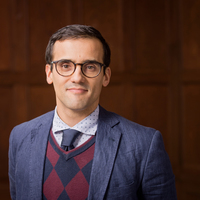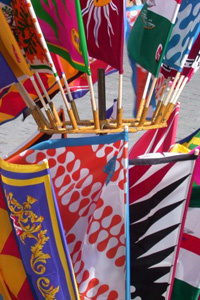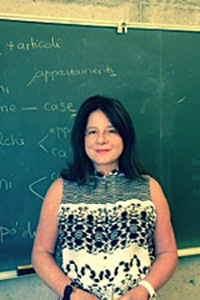Core Faculty

Filippo Gianferrari
Director, Italian Studies
I am originally from Modena, Italy. I have received a BA and MA in Letteratura italiana from the Università degli studi di Bologna, and a Ph.D. in Medieval Studies from the Medieval Institute of the University of Notre Dame. After completing my Ph.D., I taught at Vassar College and Smith College. I am very excited to be now part of the Literature Department at UCSC! I work on le Tre Corone and lay education in the Middle Ages and the Renaissance. I am interested in the ways literature and education (particularly literacy) intersect with and inform each other. I have published mostly on the topic of Dante’s intellectual formation and I am currently writing a book provisionally titled “Training the Reader: Dante and the Rise of Vernacular Literacy.” The book investigates Dante's debts to his earliest scholastic readings and his critical stance toward contemporary education.

Cynthia Polecritti
Learning about Renaissance art as an undergraduate was my gateway to the fascinating world of Italian culture. My favorite courses in college were on Quattrocento art, the High Renaissance, and Michelangelo. A few years later, when I went to UC Berkeley as a graduate student, I moved in a somewhat different direction when I to began to study “popular culture,” especially preaching, peacemaking, and public ritual in the Early Renaissance.
During this time, I had the wonderful opportunity to live for two years in one of the world’s most beautiful cities: Siena, Italy. The traditional neighborhoods and rhythms of life provided an incomparable chance to understand urban culture in depth and think about the many connections (and disjunctures) between the Middle Ages and Modern Italy. I also took advantage of my time in Italy to travel to as many old towns as possible, from Bergamo in the north to Syracuse in the south. Today, whenever I conduct research abroad, I try to add at least one new city to my lifetime travel list. Each visit teaches me something new that I can share with my students or bring to my research.
As a History professor, I enjoy working on all of these facets of Italy. I am currently writing a book on street life in the 19th century, but still love to teach the rich and complex worlds of the Middle Ages and Renaissance. My two newest courses are on the long-term urban history of Rome and on Italy’s 19thcentury. The latter class introduced me to the astonishing world of Italian opera, which will now remain another lifelong interest. The culture of Italy is inexhaustible and infinitely rewarding.

Tonia Prencipe
I was born and raised in Italy and obtained a Laurea in Foreign Languages and Literature at the University of Bari. I teach first and second year courses, including accelerated courses. Teaching is what gives me energy and inspiration. Teaching my native Italian language enables me to draw upon my own culture and personal experience as a foreign language learner as I teach my students to effectively communicate with me in my own language and, perhaps more importantly, to gain an appreciation for another language and culture. My interests include language acquisition, multicultural education, and child development in learning foreign languages.
I also serve as the program director of a non-profit organization that serves the community and works to promote and preserve the study of Italian Language and Culture. I spend my free time reading books (I just finished to read the last book of Elena Ferrante tetralogy, My brilliant friend), hiking and trying to understand some of the American sports my daughter plays. I also enjoy travelling, cooking, theater, music and spending time in nature.
Lecturer in Italian Tonia Prencipe has been awarded a grant from the Italian Consulate in San Francisco and the Department of Languages and Applied Linguistics, to teach a new course in fall 2015. Italian 100 is designed to provide intensive practice in oral and written Italian. The course will focus on key areas of vocabulary building and increased oral and written expression. Students will participate in class discussions, oral presentations, written reports, responses and essays. They will also experiment with different genres of writing, including, diaries, letters, blogs, text messaging, dialogues, short stories, memoirs, interviews, podcasts and media language.
